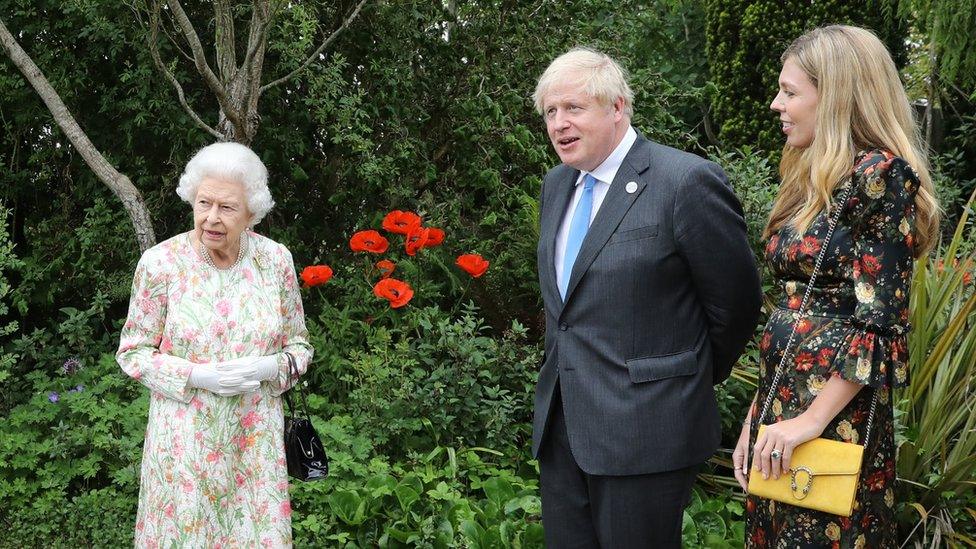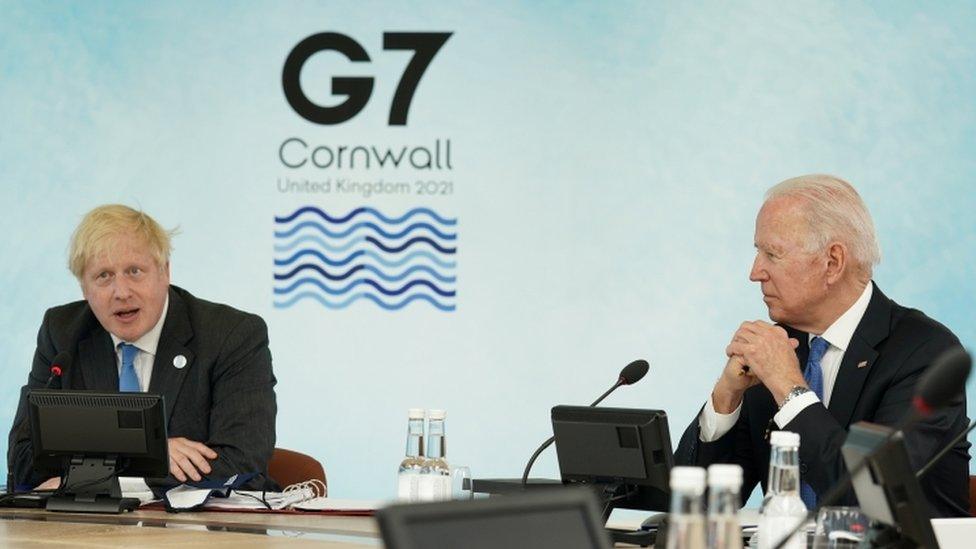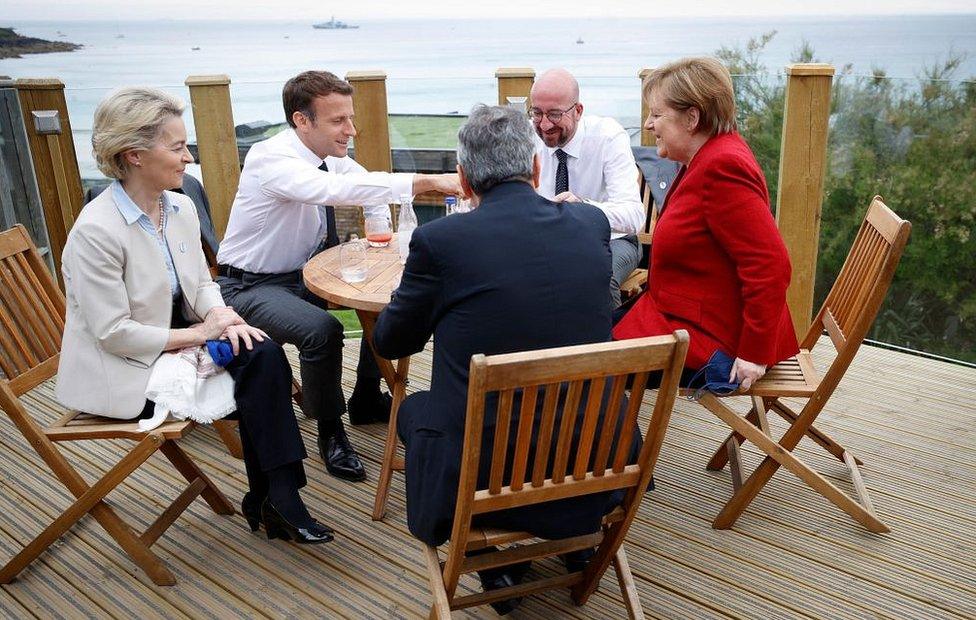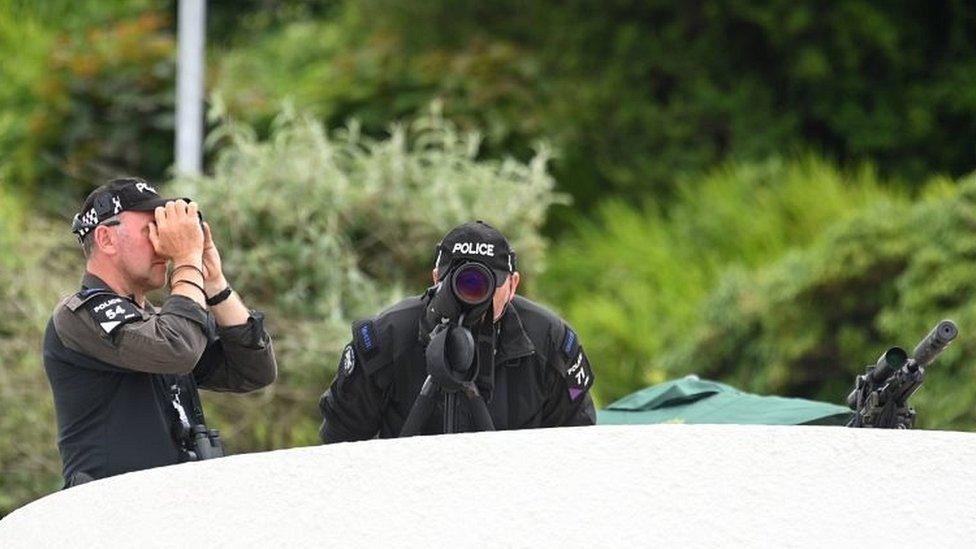G7: Boris Johnson kicks off summit with plea to tackle inequality
- Published
- comments

The Queen was greeted by the PM and his wife Carrie as she arrived at Friday evening's dinner
Boris Johnson has urged fellow world leaders to "build back better" after the Covid pandemic at this week's G7 summit in Cornwall.
The UK prime minister said it was vital to learn from the "mistakes" of the 2008 financial crisis and tackle the "scar" of inequality.
After a day of talks at the seaside resort of Carbis Bay, leaders have joined the Queen for a dinner nearby.
The distribution of Covid vaccines is also high on the summit agenda.
Earlier, the leaders posed for a group photo with the Queen, where the monarch was heard to joke: "Are you supposed to be looking as if you're enjoying yourself?"
The leaders around the Queen laughed, and Mr Johnson replied emphatically: "Yes."
The prime minister added: "We have been enjoying ourselves - in spite of appearances."
Allow X content?
This article contains content provided by X. We ask for your permission before anything is loaded, as they may be using cookies and other technologies. You may want to read X’s cookie policy, external and privacy policy, external before accepting. To view this content choose ‘accept and continue’.
US President Joe Biden is among those being hosted by Mr Johnson for the three-day meeting, as well the leaders of France, Germany, Italy, Japan and Canada.
It is the first face-to-face summit of the G7 - representing most of the world's biggest economies - since before the pandemic started early last year.
European Commission President Ursula von der Leyen and European Council President Charles Michel are also attending.
In his opening remarks at the main round-table discussions, Mr Johnson said that, as the world recovered from the pandemic, it was important to "level up across our societies" and "build back better".
He added: "I actually think that we have a huge opportunity to that because, as G7, we are united in our vision for a cleaner, greener world, a solution to the problems of climate change."
The prime minister also said it was "vital that we don't repeat the mistakes of the last great crisis - the last great economic recession of 2008 - when the recovery was not uniform across all parts of society".
Politicians are attending a Friday evening reception at the nearby Eden Project, attended by the Queen, the Prince of Wales, the Duchess of Cornwall and the Duke and Duchess of Cambridge.

Mr Johnson and US President Joe Biden attended a session earlier on economic recovery after Covid
The UK government announced it was giving £430m in aid to the Global Partnership for Education, to help the world's "most vulnerable children" get better schooling, with a "particular" focus on girls.
It was important for the world economy to rebuild in a "more equal and... in a more gender-neutral and perhaps a more feminine way" after the huge damage caused by coronavirus, Mr Johnson told his fellow leaders.
As camera crews and photographers left the meeting room at the Carbis Bay Hotel, he joked that what had been intended as a "fireside chat" had turned into a "media circus".

Several of the European leaders enjoyed a seaside drink before the talks started
Tweeting a photograph of himself, external with some of the other European leaders sitting on a seaside terrace, French President Emmanuel Macron wrote: "As always, the same union, the same determination to act, the same enthusiasm! The G7 can begin."


As G7 leaders got round the table and down to business Boris Johnson's opening remarks initially followed a familiar pattern as he talked about "building back better".
But he ended on a less familiar pledge to build back in a "more gender-neutral" and "feminine" way.
So what does that mean?
Downing Street sources are pointing to the PM's education announcement. Mr Johnson, I'm told, wants to improve the prospects of girls around the world.
While the prime minister's terminology may cause some to cringe a little ("ugh, just ugh," remarked one senior Tory MP), the underlying aim might attract praise, even if the UK government is temporarily cutting its overseas aid budget overall.
But, more broadly, the prime minister is keen to insert his "build back better" domestic agenda into the international scene.
"Build back better" also happens to be the name of Joe Biden's mammoth jobs and recovery plan.
For any G7 leader, the world stage is still a chance to reach the audience at home.

Mr Johnson has pledged the UK will donate more than 100 million Covid vaccines to poorer countries within the next year, while Mr Biden promised 500 million doses of Pfizer vaccines to 92 low and middle-income countries and the African Union.
But some charities and campaigners have criticised the scale of the UK's plan, under which 5 million doses will be given out by the end of September, with 25 million by the end of 2021 and the rest provided during 2022.
Lis Wallace, head of UK advocacy at anti-poverty campaigners One, said it was "not happening anywhere near fast enough", and called on Mr Johnson to start sharing doses straight away.
And US pop star Selena Gomez told her nearly 65 million Twitter followers that the promise to deliver 5 million vaccines by the end of September was "too little too late".
Ms Gomez was among a number of celebrities who took part in a concert aimed at increasing access to Covid vaccines in April. Mr Biden also appeared at the event, as did Prince Harry and Meghan Markle.
The G7 nations are expected to collectively agree to provide a billion doses of Covid-19 vaccine in an effort to end the pandemic in 2022.
The World Health Organization estimates 11 billion doses will be needed to vaccinate the whole world to a level of 70%, the point at which transmission of the virus could be significantly affected.

Security is tight, with thousands of extra police having been sent to Cornwall
Hundreds of people joined a march in St Ives, just along the coast from Carbis Bay, urging leaders to "address the climate and ecological emergency".
Three people were arrested a few miles away from the summit venue earlier on suspicion of possession of an article with intent to commit criminal damage, and four were arrested on suspicion of conspiracy to commit public nuisance.